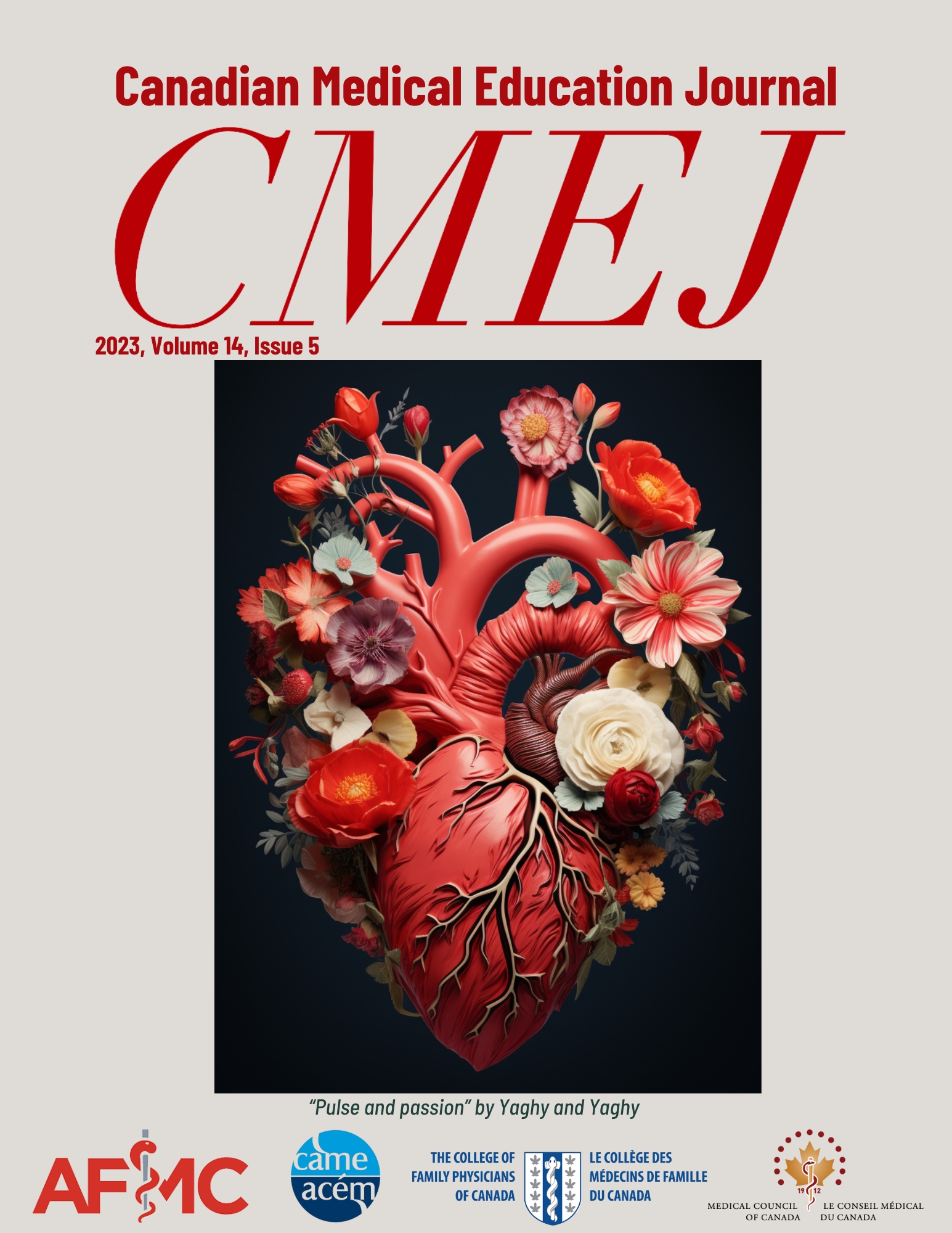Inter-institutional data-driven education research: consensus values, principles, and recommendations to guide the ethical sharing of administrative education data in the Canadian medical education research context
DOI:
https://doi.org/10.36834/cmej.75874Abstract
Background: Administrative data are generated when educating, licensing, and regulating future physicians, but these data are rarely used beyond their pre-specified purposes. The capacity necessary for sensitive and responsive oversight that supports the sharing of administrative medical education data across institutions for research purposes needs to be developed.
Method: A pan-Canadian consensus-building project was undertaken to develop agreement on the goals, benefits, risks, values, and principles that should underpin inter-institutional data-driven medical education research in Canada. A survey of key literature, consultations with various stakeholders, and five successive knowledge synthesis workshops informed this project. Propositions were developed, driving subsequent discussions until collective agreement was distilled.
Results: Consensus coalesced around six key principles: Establishing clear purposes, rationale, and methodology for inter-institutional data-driven research a priori; informed consent from data generators in education systems is non-negotiable; multi-institutional data sharing requires special governance; data governance should be guided by data sovereignty; data use should be guided by an identified set of shared values; and best practices in research data-management should be applied.
Conclusion: We recommend establishing a representative governance body, engaging a trusted data facility, and adherence to extant data management policies when sharing administrative medical education data for research purposes in Canada.
References
Chahine S, Kulasegaram KM, Wright S, et al. A call to investigate the relationship between education and health outcomes using big data. Acad Med. 2018 Jun 1;93(6):829-32. https://doi.org/10.1097/acm.0000000000002217 DOI: https://doi.org/10.1097/ACM.0000000000002217
Iobst WF, Sherbino J, Cate OT, et al. Competency-based medical education in postgraduate medical education. Med Teach. 2010 Aug 1;32(8):651-6. https://doi.org/10.3109/0142159x.2010.500709 DOI: https://doi.org/10.3109/0142159X.2010.500709
Tannebaum D, Kerr J, Konkin J, et al. Triple C Competency-based Curriculum: report on the working group on postgraduate curriculum review – part 1. The College of Family Physicians of Canada. 2011 Mar. Available from https://www.researchgate.net/profile/Allyn-Walsh/publication/316428237_Triple_C_Competency_Based_Curriculum_Report_of_the_Working_Group_on_Postgraduate_Curriculum_Review_Part_1/links/58fd4d670f7e9ba3ba55df79/Triple-C-Competency-Based-Curriculum-Report-of-the-Working-Group-on-Postgraduate-Curriculum-Review-Part-1.pdf. [Accessed May 13, 2022].
Grierson LE, Mercuri M, Brailovsky C, et al. Admission factors associated with international medical graduate certification success: a collaborative retrospective review of postgraduate medical education programs in Ontario. CMAJO. 2017 Nov 24;5(4):E785-90. https://doi.org/10.9778/cmajo.20170073 DOI: https://doi.org/10.9778/cmajo.20170073
Tamblyn R, Abrahamowicz M, Dauphinee D, et al. Physician scores on a national clinical skills examination as predictors of complaints to medical regulatory authorities. Jama. 2007 Sep 5;298(9):993-1001. https://doi.org/10.1001/jama.298.9.993 DOI: https://doi.org/10.1001/jama.298.9.993
Asch DA, Nicholson S, Srinivas SK, Herrin J, Epstein AJ. How do you deliver a good obstetrician? Outcome-based evaluation of medical education. Acad Med. 2014 Jan 1;89(1):24-6. https://doi.org/10.1097/acm.0000000000000067 DOI: https://doi.org/10.1097/ACM.0000000000000067
Chen X, Liu CY. Big data ethics in education: connecting practices and ethical awareness. JETDE. 2015;8(2):5. https://doi.org/10.18785/jetde.0802.05 DOI: https://doi.org/10.18785/jetde.0802.05
Regan PM, Jesse J. Ethical challenges of edtech, big data and personalized learning: twenty-first century student sorting and tracking. Ethics Info Tech. 2019 Sep;21(3):167-79. https://doi.org/10.1007/s10676-018-9492-2 DOI: https://doi.org/10.1007/s10676-018-9492-2
Ellaway RH, Mackay MP, Lee S, et al. The impact of a national competency-based medical education initiative in family medicine. Acad Med 2018; 93(12), 1850-1857. DOI: https://doi.org/10.1097/ACM.0000000000002387
Ben-Porath S, Ben Shahar TH. Introduction: big data and education: ethical and moral challenges. Theory Res Educ. 2017 Nov;15(3):243-8. https://doi.org/10.1177/1477878517737201 DOI: https://doi.org/10.1177/1477878517737201
Florea D, Florea S. Big Data and the ethical implications of data privacy in higher education research. Sustainability. 2020 Jan;12(20):8744. https://doi.org/10.3390/su12208744 DOI: https://doi.org/10.3390/su12208744
Government of Canada. Tri-agency research data management policy. 2022. Available from https://www.science.gc.ca/eic/site/063.nsf/eng/h_97610.html [Accessed on Apr 13, 2022].
Government of Canada. Tri-Council policy statement 2. chapter 9: research involving the First Nations, Inuit and Métis peoples of Canada. 2022. Available from https://ethics.gc.ca/eng/tcps2-eptc2_2018_chapter9-chapitre9.html. [Accessed on Mar 14, 2023].
The First Nations Information Governance Centre. Ownership, Control, Access and Possession (OCAP™): the path to First Nations information governance. Ottawa: The First Nations Information Governance Centre, May 2014. 2014 May. Available from https://achh.ca/wp-content/uploads/2018/07/OCAP_FNIGC.pdf [Accessed on May 13, 2022].
Braunack-Mayer AJ, Street JM, Tooher R, Feng X, Scharling-Gamba K. Student and staff perspectives on the use of big data in the tertiary education sector: a scoping review and reflection on the ethical issues. Rev Educ Res. 2020 Dec;90(6):788-823. https://doi.org/10.3102/0034654320960213 DOI: https://doi.org/10.3102/0034654320960213
Molldrem S, Smith AK. Reassessing the ethics of molecular HIV surveillance in the era of cluster detection and response: Toward HIV data justice. Am J Bioeth. 2020 Oct 2;20(10):10-23. https://doi.org/10.1080/15265161.2020.1806373. DOI: https://doi.org/10.1080/15265161.2020.1806373
Wesson P, Hswen Y, Valdes G, Stojanovski K, Handley MA. Risks and Opportunities to Ensure Equity in the Application of Big Data Research in Public Health. Annu Rev Public Health. 2022 Apr 5;43:59-78. https://doi.org/10.1146/annurev-publhealth-051920-110928 DOI: https://doi.org/10.1146/annurev-publhealth-051920-110928
Dowell J, Cleland J, Fitzpatrick S, et al. The UK medical education database (UKMED) what is it? Why and how might you use it?. BMC Med Educ. 2018 Dec;18(1):1-8. https://doi.org/10.1186/s12909-017-1115-9 DOI: https://doi.org/10.1186/s12909-017-1115-9
Gale TC, Lambe PJ, Roberts MJ. Factors associated with junior doctors’ decisions to apply for general practice training programmes in the UK: secondary analysis of data from the UKMED project. BMC Med. 2017 Dec;15(1):1-4. https://doi.org/10.1186/s12916-017-0982-6 DOI: https://doi.org/10.1186/s12916-017-0982-6
Jerant A, Fancher T, Fenton JJ, et al. How medical school applicant race, ethnicity, and socioeconomic status relate to multiple mini-interview–based admissions outcomes: findings from one medical school. Acad Med. 2015 Dec 1;90(12):1667-74. https://doi.org/10.1097/acm.0000000000000766. DOI: https://doi.org/10.1097/ACM.0000000000000766
Downloads
Published
Issue
Section
License
Copyright (c) 2023 Lawrence Grierson, Alice Cavanagh, Alaa Youssef, Rachelle Lee-Krueger, Kestrel McNeill, Brenton Button, Kulamakan Kulasegaram

This work is licensed under a Creative Commons Attribution-NonCommercial-NoDerivatives 4.0 International License.
Submission of an original manuscript to the Canadian Medical Education Journal will be taken to mean that it represents original work not previously published, that it is not being considered elsewhere for publication. If accepted for publication, it will be published online and it will not be published elsewhere in the same form, for commercial purposes, in any language, without the consent of the publisher.
Authors who publish in the Canadian Medical Education Journal agree to release their articles under the Creative Commons Attribution-Noncommercial-No Derivative Works 4.0 Canada Licence. This licence allows anyone to copy and distribute the article for non-commercial purposes provided that appropriate attribution is given. For details of the rights an author grants users of their work, please see the licence summary and the full licence.











